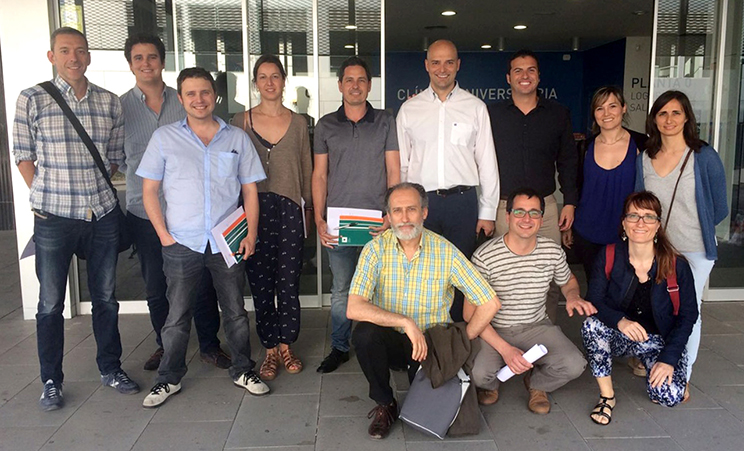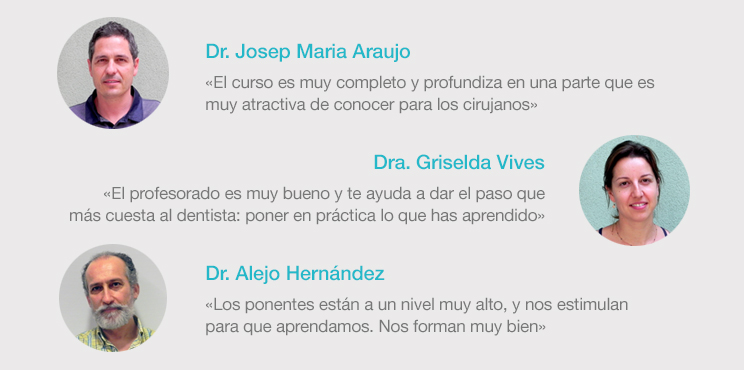

The field of dentistry is still undergoing continuous digital transformation as the result of ongoing scientific research and technological innovation. Most notable in this constant evolution is dental implantology, undoubtedly the dental specialty that has witnessed the most changes over the past twenty years. This fascinating scenario is what prompted AVINENT Implant System to commit strongly to first-class innovative training in order to meet the current demands of the dental industry.
The second Course on Advanced Dental Implant Surgery was recently successfully conducted, jointly organized by the Fundació Universitària del Bages (FUB) and AVINENT. Aimed at dentists, stomatologists and maxillofacial surgeons, the course was again led by Dr. Daniel Capitán Maraver, who was accompanied by an elite teaching group comprising Doctors Abelardo Alegría, Ramón Gómez Meda, Norberto Manzanares and Juan Zufia.

A clear example of AVINENT’s commitment to training. «I was looking for a course that would allow me to learn more advanced techniques and I found it here», explains Dr. Griselda Vives, one of the students on the course. Another student, Dr. Josep Maria Araujo, notes: «Some companies are simply engaged in selling, but here they are committed to training».

«It is not a basic course, because you learn sophisticated techniques», explains Dr. Vives, who then adds: «First, you study the theory and then the practice, and the great thing is that you can already put it into practice in your clinic the following week». Dr. Araujo also emphasizes this point and claims: «It has a very good format that helps you to attain a high level of understanding».
Dr. Alejo Hernández, also a student on the course, states: «In my 30 years as a professional, I have had the time to attend many courses, but the setting up of this course was a brilliant idea, because I had not seen any others like it». He adds: «Some courses are overly influenced by the sale of a product and you can even notice this influence in the speakers. This prejudices the learning process». Nonetheless, he believes that the case of AVINENT is different because «it provides the speakers with a lot of freedom, imparting knowledge that is transparent and undiluted in this respect».

How do you assess this second edition of the course?
Very positively. The experience we gained from the first edition helped us to conduct this one more effectively.
What was the overall goal?
To provide a program that dealt with advanced implant surgery at an affordable price for students, with the aim of providing them with step-by-step explanations of all the necessary techniques. The main idea is that students can start applying these techniques in their daily consultations on the day after completing the module.
What sort of feedback have you received from students?
The feedback has been excellent. People are very satisfied. We always like talking to them directly after each module to see if they are satisfied and if they think that anything can be improved. It is important to always be improving.
You have worked on several training courses in the sector, what makes this course so different?
One of the most interesting points is that it has been designed for a reduced number of people – ten students this year – and this means that teacher-student relationships are much closer and direct. Another benefit is that it provides the theory and progresses step-by-step with the diagnosis, implementation of the technique and bone maintenance. We are often used to seeing only the result, or how one or other technique works, all explained too quickly and more generically. But here we attempt to go into more detail.
What role does AVINENT play in this course?
The course would not be possible without the backing of AVINENT. Not only in terms of material, an aspect in which AVINENT is fully involved, but also at an organizational level. I am very grateful. The program was presented here at the university many years ago, but it could not be implemented until AVINENT became involved in the project.
What do you think about its commitment to training?
AVINENT’s commitment has been outstanding, because without training there is nothing.